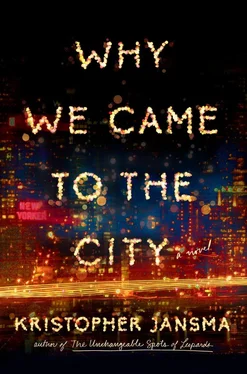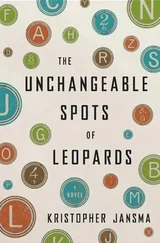Jacob could barely hear himself saying, “Sure, sure. Of course.”
Oliver was standing, arms folded against himself, his face turned away. Coldly, he sorted papers into his bag to take home. Then he handed Jacob the keys to the truck and walked off with Officer Himmel.
Jacob went into the bathroom to stick his face under the tap, slurping coppery water until his mouth was numb and his stomach was full and sick. He fumbled his way into the stall. It was like being hung over — or still drunk from a week ago. Fuzzy sheet over his eyes, cotton in his mouth and ears. He’d never had a panic attack before. He’d always figured it would be like being out of breath, but he was breathing fine, even though his nostrils stung as if he’d been huffing Sriracha. He ground the heels of his palms against his eyeballs, which felt as if they’d been turned to marbles inside their sockets. When he felt like he could walk again, he went straight to Oliver’s parking spot and jumped into the truck.
At first he intended to just head back to Oliver’s early — maybe lie down for a while and flip through one of the pretentious little green leather-bound Poetry Classics volumes that he kept way up on the top shelf in his study, so no one could see they’d come through some Time-Life subscription service back in the 1980s. But as Jacob went out the back way and got onto the Hutchinson River Parkway, he began to dread the idea of lying there alone in the flat . Waiting for the sound of keys in the door and knowing it would be Oliver, all sad and depressed, or maybe still aloof and despondent as he’d been in the office.
Steadily, Jacob accelerated. The trees along the parkway were brilliant green and moving lightly in the breeze. He rolled the window down a little and set the radio dial to seek. He’d never even met the elder Dr. B. Probably Oliver had known this was coming. He was probably more annoyed about having to pay for the Porsche.
Jacob wondered what he’d do if his own father died. Probably drink heavily. Certainly be extra rude to people like Oliver. And he didn’t even like his father — Oliver and his dad had been quite close. Well, no, not that close. The real problem was that Jacob was dating a man in his late fifties who was still basically in the closet. The old man had gone to his grave believing that his son was straight. Still asking when he and his ex-wife would finally get back together. Now Jacob wondered if, somewhere deep down, Oliver wasn’t relieved: both his parents had died without knowing their son slept with men.
Jacob remembered coming out to his own parents at age fifteen to Royal Shakespeare Company — level hysterics. His father had sworn solemn oaths, and his mother had literally beat her breast. Oliver had never lived through such a scene. True, post-fallout had been better — he got a rare apology from his father and had gotten to watch him reading, in extreme discomfort, self-help books with titles like Love Is All: Accepting Your Gay Son . That had been pretty priceless; there had been illustrations. Plus, he’d got to check out men at the mall with his mother after school.
Jacob hardly called his parents now and only visited on his birthday. He wondered how it would feel to be an orphan.
The radio came onto a classic rock station, and Jacob punched the button to hold it there on the tail end of “Paradise City.” He cranked it as high as it would go, rolling both the windows down so that the wind roared back and forth across the bench seat. “‘Oh won’t you please oh take me hooooooome…’” He recalled nights in dark Ithaca basements, lost in the strobing of jury-rigged lights, voices all around him shouting this anthem from before their time.
Jacob sped up, sailing around each bend, tacking between lanes around sad little Hondas and Kias and Scions. His heart thundered, and cool air pummeled his face with tiny fists. The music crescendoed and crashed into silence, and Jacob felt as if his whole body might burst. Just then a little prerecorded promo came on: Two for. Two for. Two for Tuesday. Jacob remembered loving this as a kid, when they’d play a second song by the same artist, right after the first. And softly, the rising return of Axl’s moan, knock knock knocking on heaven’s door and Jacob pounded his fists against the steering wheel, lost in a joy greater than he’d felt in over a year, ecstatic — filled up like this by not just one song but a second, just when it ought to be over.
Like a multiple orgasm — a subject of intense debate once between himself and George — whether guys could ever have one. Sting claimed it was possible. Back at school Jacob had wanted to sign up for a course in “orgasmic mastery” taught by a Dr. Koolhaus downtown. Sara had said it was God’s way of making it up to women for childbirth. Then Irene told stories about nights she’d spent with a woman in Detroit who could wrap her tongue around a Coke can. He could remember how George squirmed, trying not to lose his mind thinking about that — hopeless. Even Jacob had taken a cold shower.
He noticed that he’d gone past the exit that cut over to Stamford. Way past it. He was seeing signs for Meriden, still heading north toward Hartford.
From there, he vaguely knew, he must be able to take something else east toward Boston.
It all seemed so simple, he didn’t know why he hadn’t seriously considered it before. He’d crash on the couch at George’s for a week or two. It would be good to see them again. It had been petty of him, not uncharacteristically so, but now it had gone on long enough. Of course George should go to Boston and work at fucking Harvard if he got the chance — and just because he looked happy in Facebook photos didn’t mean he actually was. George was just unflappable — that was what everyone liked so much about him.
Jacob wondered how he would get Oliver his truck back. Probably stealing it wasn’t the nicest thing to do to someone who’d just lost his father. Now the classic rock station had on some Joni Mitchell bullshit. He wanted something angry. Less Bob Dylan, more Dylan Thomas. To Dr. Sr.! — Jacob raised an imaginary glass to the windshield. Driving around a Westchester Country Club golf course in a stolen Porsche. He had to hand it to Dr. B. — at least he’d gone out on his own terms. Rage, rage against the dying of the light . Maybe that was why it had been so brutal, at the end, to see Irene lying there in the bed all morphined and breathing on a machine and, well, going gentle. If old age ought to burn and rave, then youth ought to be downright atomic. There shouldn’t have been anything spared for miles after Irene went out. She should have decimated the entire city, with no one left standing.
Soon Jacob grew tired of driving, tired of the trees, and tired of the second Joni Mitchell song on the radio. “Two for Tuesday” could cut both ways. He was tired of never knowing how he’d be feeling next: panicked, annoyed, orgasmic, weepy, worn out. Traffic had slowed to a crawl in the right lane and was barely faster in the left. He inched along, following a red snake of brakelights around the winding curves, until at last he saw the cause of the holdup. About ten cars with their flashers on, moving slowly as one through the right lane, and the left clogged with people trying to get around. One by one Jacob passed the cars in the right lane line until at last he pulled up ahead of the chain, to the black hearse with purple zinnias ornamenting the hood. PAULSON & PETERSON FUNERAL HOMES was written discreetly along the side. Just as he was about to pass it, the traffic ahead of them slowed down, then stopped.
Jacob tried not to look over at the hearse through the passenger-side window. He pictured Oliver down in some hospital basement, like where they must have kept Irene, afterward. Some creep balding doctor opening a metal drawer in a refrigerated wall. Inside, at first, just a pile of white sheets, as if someone had forgotten to make the bed. Just have a look, and we’ll be all done here. Underneath, a life-size-doll version of the man who raised him. Made of something cold and white that isn’t skin. How hard it would be to believe it — to say, Yes, this is my father —when you didn’t see it happen.
Читать дальше












